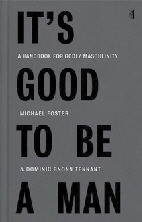Review Of "It’s Good To Be A Man" -- By: Matt Damico
Journal: Eikon
Volume: EIKON 06:1 (Spring 2024)
Article: Review Of "It’s Good To Be A Man"
Author: Matt Damico
Eikon 6.1 (Spring 2024) p. 128
Review Of It’s Good To Be A Man
Matt Damico is the pastor of worship and operations at Kenwood Baptist Church in Louisville.

Michael Foster and Dominic Bnonn Tennant, It’s Good to Be a Man: A Handbook for Godly Masculinity, Moscow, Idaho: Canon Press, 2021, 2022.
The title of Michael Foster and Dominic Bnonn Tennant’s book, It’s Good to Be a Man, may not have made sense had it been published twenty or thirty years ago. But times have changed. Rampant fatherlessness and cultural headwinds have men questioning not only what it means to be a man, but whether it’s worth being one at all.
This is why Foster and Tennant have not set out to write a timeless book, but “a timely one” (x), one addressing current issues. While It’s Good to Be a Man is for the same audience as previous books aimed at Christian men, the books of decades past shared an assumption that can no longer be granted: that it’s okay, or even good, to be masculine. Foster and Tennant go further back and start there.
Eikon 6.1 (Spring 2024) p. 129
Appreciation
Foster and Tennant have written a useful guide that understands the times, and there are many things to appreciate. For one, they grasp the role of nature in understanding manhood — that men are, by nature, built to lead: “Male rule is natural, and so it is inevitable…because it is natural, it cannot be destroyed—but it can be twisted” (5). The question is not whether men will lead, but what kind of men will lead and how they will do so. Would that this were widely acknowledged.
Second, they give strong, sound counsel throughout the book. For example, an entire chapter calls men to cultivate gravitas as a masculine virtue. Lest that be too abstract, the following chapter describes what gravitas looks like. Positively, it looks like growing in wisdom, workmanship, and strength (145–49). Negatively, it calls men to stop seeking praise, stop being self-deprecating, stop complaining, stop making excuses, and stop breaking promises (150–52). Any man would do well to listen to such exhortations.
Third, Foster and Tennant extol the ancient paths of marriage, fatherhood, and work. Their chapter on fatherhood is especially helpful, as they see the absence of fathers to be the source of so many cultural ills. They use the phrase “clueless bastards” to refer to the young men who grew up without good fathers, rightly claiming that “the collapse we face today is primarily caused by clueless bastards who don’t know how to be fathers— upholders of order. And they don’t know this, b...
Click here to subscribe
